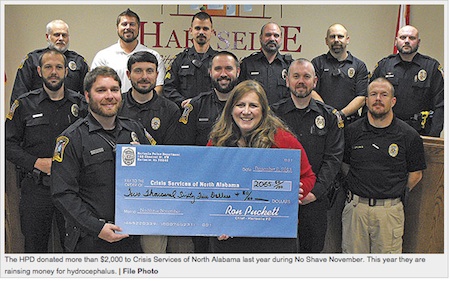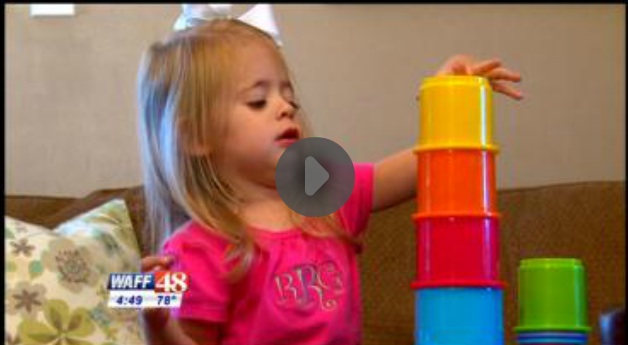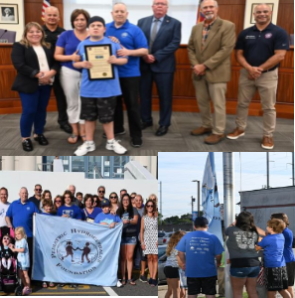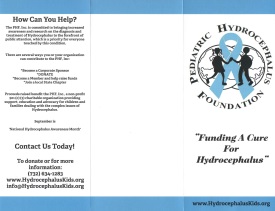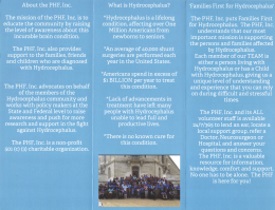PHF In The News: HPD officers grows beards for hydrocephalus
November 22, 2014 by PHF
Filed under Uncategorized
Comments Off on PHF In The News: HPD officers grows beards for hydrocephalus
The Hartselle Police Department has opted to waive their no-facial-hair policy for a good cause for the second year in a row.
Several officers are electing to participate in No Shave November to raise money for the Pediatric Hydrocephalus Foundation. This non-profit organization was chosen by the police force because Sgt. Kel Roberts has a daughter with hydrocephalus, and he and his wife Danielle helped charter an Alabama chapter of the PHF.
Reagan Roberts, 3, has a condition that causes cerebrospinal fluid to collect around the brain and spinal cord, which was once known as “water on the brain.” The most prevalent treatment for this irreversible condition is a shunt that drains the fluid from the brain into another part of the body, usually the abdomen. Reagan has already had three brain surgeries and a shunt.
Roberts said there is little funding for research on this condition that affects about one in every 500 births.
“There’s not a lot out there to treat or learn about hydrocephalus,” Roberts said. “It only gets a small portion of government funding for research, which is a tiny amount compared to other, less prevalent conditions. While research for all conditions is great, we wanted to do what we could to promote hydrocephalus.”
The Roberts family looked for a way to raise money and spread the word about the cause. Danielle is now the Chairman of the Alabama chapter of the PHF, and he is the Co-Chair. Roberts suggested the police department use their annual fundraiser to benefit the condition.
“Our chief lets us break the facial hair policy in November if each officer in the competition raises $100,” Roberts said. “Each officer collects money, and we have a website to keep up with who is involved and how much has been raised. We accept cash or checks made out to the Pediatric Hydrocephalus Foundation. People can specify which officer they want to support or just let the officers split it equally.”
Donations can be made to their website active.com/donate/phfshave until Nov. 30. Visitors can also see who has donated, how much money each officer has raised and the total amount raised. The officers are competing for special individual awards including The Highest Earning Beard Award, The Ultimate Beardster Award, The Grayest Beard Award and The Baby Face Beard Award.
The 10 participating officers have raised $1,175 so far.
Roberts said he is excited for the police force to be able to help fund hydrocephalus research.
“We thought this fundraiser would really make it a local effort that would mean a lot to us,” Roberts said. “I’m very proud to be a part of this and we hope we can continue to do our part no matter how small it might seem. I know most people know someone with hydrocephalus, but they don’t know what it’s all about. Maybe our funds can help educate and touch the lives of people and families living with hydrocephalus.”
PHF In The News: Hartselle police officers go ‘beard to beard’ to raise money
November 21, 2014 by PHF
Filed under Uncategorized
Comments Off on PHF In The News: Hartselle police officers go ‘beard to beard’ to raise money
HARTSELLE, AL (WAFF) — Hartselle police officers are teaming up with the Alabama Pediatric Hydrocephalus Foundation to raise money with the No Shave November Contest for a Cure.
Each participating officer began November with a clean shave, and they will go “beard to beard” to raise the most money by Nov. 30.
Each officer has been given a minimum goal of $100 to participate.
At the end of November, each officer will be eligible to win an award in the following categories:
The Highest Earning Beard Award
The Ultimate Beardster Award
The Grayest Beard Award
The Baby Face Beard Award
You can click here to see the participating officers and find out how to donate to the cause. You can also find out more about the Pediatric Hydrocephalus Foundation and what their mission is.
PHF In The News: Family beats odds on child’s diagnosis
May 21, 2014 by PHF
Filed under Uncategorized
Comments Off on PHF In The News: Family beats odds on child’s diagnosis
Danielle & Kel Roberts are the PHF State Chapter Directors of Alabama
HARTSELLE, AL (WAFF) –
Young mother of two Danielle Roberts told us, “I was 16 weeks pregnant when they told us she had hydrocephalus.”
Her husband Kel Roberts said they were shocked to learn the daughter Danielle was carrying had water on her brain.
“There was so much damage and so little brain that was left that she really wouldn’t have a chance, and we were asked to make a choice at that point whether or not to ‘carry on,” he said.
And carry on they did. Kel said there was a lot of prayer and support.
“If we back track to the very beginning, there was not a whole lot of hope for anything. We’re three years more than what they really gave us,” he said.
Reagan is now a sweet, coy three year old with a shunt. Her mom described how it works.
“This part goes in the brain and it drains the pressurized fluids. Once that fills up, it will drain out and it drains out into about her abdomen,” said Danielle.
She says the body absorbs the fluid. This is basically the same technology available in the 70’s.
There are some developmental delays with Reagan.
“The biggest delay that she’s got would be mobility,” said Danielle.
Reagan’s grandmother has a nickname for this precious bundle. She calls her ‘Amazing Grace,’ and it’s easy to see why.
He dad says she’s making great progress.
“She is not limited in any way. She gets around on her own. She is more than capable and more than willing and strong enough to do and be what ever she wants to be,” said Kel.
She recently suffered a seizure, so her parents took her to her neurologist. Current test results show remarkable improvements. “She is super intelligent. I mean it just blows us away every day. And we treat every day as a miracle”, adds Kel.
To learn more about hydrocephalus:
Active.com
Hydrocephalus kids blog
AL Pediatric Hydrocephalus Foundation
National Institute of Health
Ind. woman educates others about hydrocephalus
January 27, 2013 by PHF
Filed under Uncategorized
Comments Off on Ind. woman educates others about hydrocephalus
 BLOOMINGTON, Ind. (AP) — When 25-year-old Megan Elmore was 20 weeks pregnant with her second child, she underwent a routine ultrasound in the office of her Bloomington obstetrician/gynecologist.
BLOOMINGTON, Ind. (AP) — When 25-year-old Megan Elmore was 20 weeks pregnant with her second child, she underwent a routine ultrasound in the office of her Bloomington obstetrician/gynecologist.
“Her head measurement was way off,” said Elmore, a single mother from Gosport whose firstborn is a healthy 2-year-old son. “I was very concerned.”
Further testing at two Indianapolis hospitals revealed that her baby, Aila, had hydrocephalus — an incurable condition that causes excessive fluid to collect in the brain, abnormally enlarging the head and placing potentially fatal pressure on brain tissues. The disorder affects about 1 in every 500 births.
When Aila was born four months ago, her head circumference was 46 centimeters, about 11 centimeters larger than normal for a full-term newborn. At the Riley Hospital for Children at IU Health, doctors placed a shunt into her skull just above her temple to drain fluid from her brain into a tube that empties into her abdomen.
But the shunt does not drain all the excess fluid because Aila is missing most of her cerebral cortex, a sheet of neural tissue in the brain that plays a key role in memory, attention, perceptual awareness, thought, language and consciousness.
“If they drained all the fluid, her brain would collapse and she would probably die,” Elmore told The Herald-Times (http://bit.ly/XQB5wv ). “So the shunt is used to keep her fluid level stable and prevent the pressure on her brain from becoming dangerous. She will need the shunt for the rest of her life.”
Elmore said it’s too early to know the long-term effects of Aila’s condition, which can cause such things as learning disabilities, memory problems, motor skill disabilities, seizures and hearing or vision problems.
“The doctors can’t say whether she will be able to walk or talk,” she said. “But so far, she is eating and breathing on her own. My hope is that she will be able to have a life as full and productive as humanly possible.”
During her pregnancy with Aila and after her daughter’s birth, Elmore received a wealth of support from not only from her mother and other family members, but also from the Pediatric Hydrocephalus Foundation, a nonprofit organization with 30 state chapters that funds research and provides support to families, friends and children affected by the disorder.
“The foundation helped me know what questions to ask the doctors,” Elmore said. “There are times when I got overwhelmed, and the people at the foundation calmed me down and explained things to me or told me where I could find the information I wanted.”
So when Elmore learned the director of the Pediatric Hydrocephalus Foundation’s Indiana chapter had stepped down, she volunteered to fill the position.
“I didn’t want any family to face hydrocephalus alone,” said Elmore, who answers to a board of directors. “I wanted to make sure the state chapter would be there so they could get the same kind of help and support that I received.”
Since assuming the directorship in November, Elmore has placed educational pamphlets about hydrocephalus in pediatricians’ offices, made efforts to form family support groups, and put information about the state organization on Facebook.
“I also hope to have two local fundraisers within the next year that will include all the kids and their families,” she said.
Elmore was recently delighted to learn that the national Pediatric Hydrocephalus Foundation has selected Aila and a young boy to be the 2013 faces of the organization. The two infants, along with their stories, will be printed in pamphlets that will be mailed to U.S. congressional representatives and used in other educational outreach efforts.
“The foundation is hoping their story will inspire families to realize that just because your child has hydrocephalus, it doesn’t mean your child’s life is over,” she said.
The Pediatric Hydrocephalus Foundation raises awareness about the disorder and raises money for research on treatment options and, hopefully, a cure. The foundation also advocates on behalf of members by asking state and federal legislators to push for more research and support in the fight against hydrocephalus.
Since 2010, the foundation has awarded $125,000 in grants and donations to hospitals, neuroscience institutes and medical research centers for research and education.
PHF’s Alabama State Chapter Director Danielle Terry Roberts featured in the Decatur Daily
October 3, 2012 by PHF
Filed under Uncategorized
 Banding together: Families unite to raise funds for brain disorder foundation
Banding together: Families unite to raise funds for brain disorder foundation
When Danielle Roberts was pregnant with her second child, Reagan, her doctor diagnosed hydrocephalus, a condition in which an excess of cerebrospinal fluid built up in the infant’s brain. Doctors delivered Reagan
on March 8, 2011, at Vanderbilt Children’s Hospital in Nashville.
Years earlier, another Hartselle woman, Leslie Etheridge, went to Decatur General Hospital for what she thought would be a normal delivery. “I ended up in an emergency (cesarean) section,” Etheridge said. “Even then, I had a difficult time because the baby’s head was so long.” She said she had never heard of hydrocephalus until her doctor explained the condition of her only child, Kane.
“The term ‘water head’ or ‘water babies’ from high school days came to mind,” she said. “Our son was taken immediately to (Children’s of Alabama) in Birmingham.”
When Etheridge heard about Roberts, she sent an email to offer support.
“During the past year, we’ve emailed each other, spoke on the phone and gone on Facebook,” Roberts said. “But we’ve never met.”
That will change Saturday at Wilson Morgan Park when the families converge at noon for the first fundraiser in Alabama for the Pediatric Hydrocephalus Foundation.
The event, organized by Roberts when she became director of the state chapter late last year, will run until 3 p.m. The foundation formed more than three years ago and has chapters in 27 other states.
The Morgan County sheriff’s helicopter will drop in, and Hartselle police donated an old police cruiser for a smash-up as part of the fundraiser.
“People who want to take part will wear safety goggles,” Roberts said. “Three hits will cost $5 and five hits will cost $8.”
The group requests a $5 donation for each person who attends and meal tickets for the hot dog bar will be $2 each.
Roberts and her husband, Kel, have another child, Kayden, 6, a first-grader at Priceville Elementary School.
Etheridge and her husband, Mike, have assisted Kane, 17, their “miracle baby,” through the ups and downs of life. He is a senior in the Instructional Resource Center at Hartselle High School.
Roberts has no idea how many people from the community will turn up to show their support Saturday or how many new friends, whose lives are impacted by hydrocephalus, she will meet.
“We’re so new to this,” she said. “We don’t know of many other families dealing with the disease. But we’d like for all of them in our area to come forward so we can offer each other support.”
Kane Etheridge, taking a break from an adapted physical education class at Hartselle High on Wednesday, eagerly spoke about his interests, which begin and end with “Star Wars” movies.
“I’ve recently started making my own movie, called ‘The Rise of a New Empire,’ ” he said. “I’ve got 50 percent of the manuscript done, I think. I’m typing it on my dad’s computer.”
Belinda Kay, a Hartselle High special education teacher, said Kane is involved in numerous classes and activities at the school.
“He’s very well liked and a very confident person,” Kay said. “At least half the students know him by name. The Tiger Buddies Club nominated him for Homecoming King.”
The Etheridge family is considering a vacation to Los Angeles in 2013 to honor Kane’s graduation. And Kane is confident he will meet George Lucas at the filmmaker’s home in nearby Modesto.
“I’m going to go over my movie with him and ask him for a job,” Kane said. “And when he sees my movie, he might hand me his company.”
Strikes 1 in 500 children
Hydrocephalus affects an estimated 1 in 500 children. Injuries or infections before birth and brain injuries later in life can cause hydrocephalus. Former Arizona Congresswoman Gabrielle Giffords acquired the disease after being shot in the head last year.
 Read more at: https://html.com/attributes/img-width/>
Read more at: https://html.com/attributes/img-width/>
